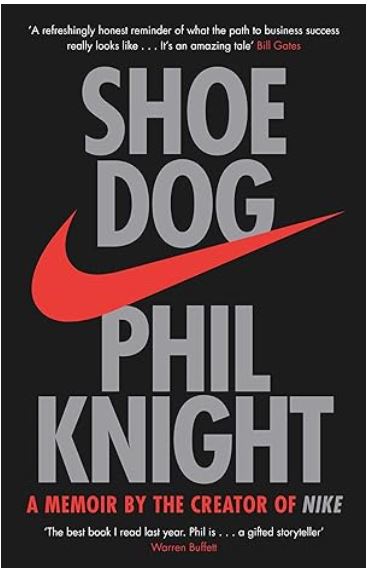The Reading Room

Shoe Dog: A Memoir by the Creator of NIKE
Phil Knight
Published: 2016, Simon & Schuster
Shoe Dog is a term used in the footwear industry to describe individuals passionate about shoemaking. It is a roller coaster journey of one of the most extroverted and extravagant companies, Nike, which was shaped by its rather introverted founder, Phil Knight. True to his name, Knight built and guarded the company’s moat, ensuring that Nike raced to new heights of dominance.
The book starts with the founder, Phil Knight, running around his hometown and then the world in a quest to quench his existential crisis. He lies about a company when there is none, teams up with the legendary coach Mr. Bill Bowerman, which he couldn’t have dreamt of, distributes for Japanese juggernaut Onitsuka Tiger, competes with them when things go south, and amidst many such bumpy rides, Knight and his uniquely unusual team scrape and march forward to the top of the world. It is a hero’s journey and a journey worth reading and reflecting on.
At the heart of why Nike succeeded, while it seemed that it just sold shoes, there was something much more to it. Nike honoured great athletes and it honoured great athletics. That is the soul of Nike and that’s what has made it so timeless and iconic!
Following insights struck a chord with me:
Don’t put your eggs in one basket: Nike was overly dependent on Onitsuka Tiger as its supplier. It risked extinction when Onitsuka decided to terminate its contract and find a new distributor. Nike had to start from scratch by selling its own shoes.
Misfits or Mavericks? An inordinate amount of energy and focus are spent on hiring the “best.” While a degree is a great filter, it’s not the end of the world. At the same time, there is disdain for non-work-related eccentricities such as being too extravagant or too arrogant. The key is chemistry, not individual islands of excellence. Nike had a team that would have looked nondescript on paper but was solid in execution. The chemistry and roles of each member were impeccable. Jeff Johnson, the passionate problem solver; Del Hayes, the accounting genius; Rob Strasser, the king of negotiations; and Bob Woodell, paralyzed from the waist down but galvanized the company as the operations head. 1+1=11.
Perseverance: Nike could have folded many times. Banks were unwilling to sanction loans, Onitsuka terminated its deal, Bill Bowerman retired, and the list goes on. Yet Nike kept chugging along. Just by surviving, it found its breakout moments, like signing superstar Michael Jordan, and kept building on its success. Never complacent, never satisfied. In athletic terminology – never “retired.” That is the secret of its success.
Innovate or Die: The world is ruthless. One who adapts lives to see tomorrow. Nike lived by the adage that the best way to predict the future is to create it. As Shoe Dogs, they used to and continue to innovate on behalf of their customers. Whether it was the waffle trainers or Air Jordans, they were totally devoted to the craft of making better shoes.
What sets Shoe Dog apart is Knight’s unflinching honesty and desire to be victorious. He doesn’t cry over the hardships; instead, he delves into the financial struggles, legal battles, and personal sacrifices that marked Nike’s early years, seeking solutions all the time. This candidness makes the book incredibly relatable and inspiring, as it underscores the reality that even the most successful ventures are built on a foundation of perseverance and grit, having to fight tooth and nail for survival.
Phil Knight’s deeply moving memoir is a shining example of dreaming big and winning big no matter the odds. The cowards never started, the weak fell along the way; that leaves us. So, keep trying and keep fighting. The world needs many more Nikes and Knights in shining armour. Just do it!
The information contained above and in other entries in the Ocean Dial Book Review Series is intended for general information and entertainment purposes only, and should not be relied upon in making, or refraining from making, any investment decisions. No information provided herein should or can be taken to constitute any form of advice or recommendation as to the merits of any investment decision. You should take independent advice from a suitably qualified investment adviser before making any investment decisions.
Chip War – The Fight for the World’s Most Critical Technology
Published: 2022, Simon & Schuster
Power in the modern world – military, economic, geopolitical – is built on a foundation of computer chips. America has maintained its lead as a superpower because it has dominated advances in computer chips and all the technology that chips have enabled. Now that edge is in danger of slipping, undermined by the naïve assumption that globalising the chip industry and letting players in Taiwan, Korea and Europe take over manufacturing serves America’s interests.
Poor Charlie’s Almanack: The Essential Wit and Wisdom of Charles T. Munger
Published: 2023, Stripe Press
From 1733 to 1758, Benjamin Franklin, the Founding Father of the United States of America, dispensed useful and timeless advice through his book Poor Richard’s Almanack (“Poor Richard” being the pseudonym adopted by Benjamin Franklin for this purpose). Among the virtues extolled were thrift, duty, hard work, and simplicity. Then some two and fifty hundred years later Charlie Munger stepped forth with Poor Charlie’s Almanack, a collection of speeches and talks by Charlie Munger first published in 2005.
The Ride of a Lifetime
Published: 2019, Transworld Publishers
Robert Iger became CEO of The Walt Disney Company in 2005, during a difficult time. Competition was more intense than ever and technology was changing faster than at any time in the company’s history.


